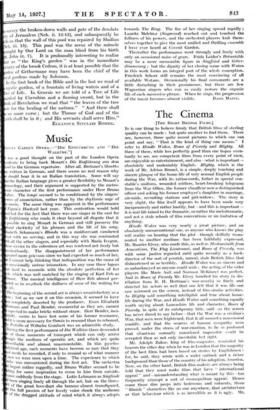Music
UVENT GARDEN OPERA.—"DIE ENTJETHRUNG AND "DIE WALKURE."1
c was a good thought on the part of the London Opera ildicate to bring back Mozart's Die Entfithrung aus dem oiwil to the German repertoire. After all, Bretzner's libretto written in German, and there seems no real reason why should hear it in an Italian translation. Some will say at the Italian language gives a greater flexibility to Mozart's hraseology, and their argument is supported by the metro- imic character of the first performance under Herr Bruno titer. The tempi seemed to be conditioned by the singers' .wers of enunciation, rather than by the rhythmic urge of c music. The same thing was apparent in the performance Pigaro's Hachreit last year. This contention would hold wid but for the fact that there was one singer in the cast for ,t. Entliihrung who made it clear beyond all dispute that it possible to sing Mozart in German and still preserve the ural elasticity of his phrases and the lilt of his song. i‘alictli Schumann's Blondes was a maidservant cumbered ,nt with no serving, and in this way she was contrasted th all the other singers, and especially with Maria Ivogun, use service to the coloratura art was rendered not freely but u,cientiously. The disappointment of her performance peared more grievous since we had expected so much of her, I cannot help thinking that indisposition was the cause of r occasionally untrue intonation. In any case these lapses re hard to reconcile with the absolute perfection of her le, which was well matched by the singing of Karl Erb as Mont. The musical intelligence of Herr Erb almost per- ed us to overlook the dullness of sonic of the writing for The beginning of the second act is always unsatisfactory as a Re ; but as we saw it on this occasion, it seemed to have completely deserted by the producer. Even Elisabeth iumann and Paul Bender, resourceful as they are, cannot expected to make bricks without straw. Herr Bender, inci- ally, seems to have lost some of his former resonance, d it is more necessary for Osmin to resound than to rebound. Pedrillo of Wilhelm Gombert was an admirable study. During the first performance of Die llalkiire there descended of those moments of transport which can only arrive ugh the medium of operatic art, and which are quite eseribable and almost unaccountable. In this pyscho- Iytical age, such moments have become so rare that they 't needs be recorded, if only to remind us of what manner Hies we were once upon a time. The experience to which refer was encountered during the first act. The orchestra begun rather raggedly, and Bruno Walter seemed to be sag for some inspiration to come to him from outside. tame suddenly from the stage. Lotte Lehmann as Sieglinde ,been singing finely all through the act, but on the thres- q of the great love-duet she became almost transfigured, the full passion of her lovely voice shook the audience of the drugged attitude of mind which it always adopts towards The Ring. The fire of her singing spread rapidly ; Lauritz Melchior (Siegmund) reached out and touched the fullness of his powers, and the orchestral players knit them- selves together to give the most unified awl thrilling ensemble I have ever heard at Covent Garden.
Thereafter the performance went strongly and freely with only an occasional noise of gears. Frida Leider's Briinnhilde may be a more memorable figure in Siegfried and GOtter- deimmerung ; but the dignity of her closing scene with Wotan in this work forms an integral part of the whole conception. Friedrich Schorr still remains the most convincing of all available Wotans. Occasionally his final consonants are a little disturbing in their prominence, but there are few Wagnerian singers who can so easily restore the organic life of each successive phrase. When he sings, the progression of the music becomes almost visible. BASIL MAINE.


























































 Previous page
Previous page